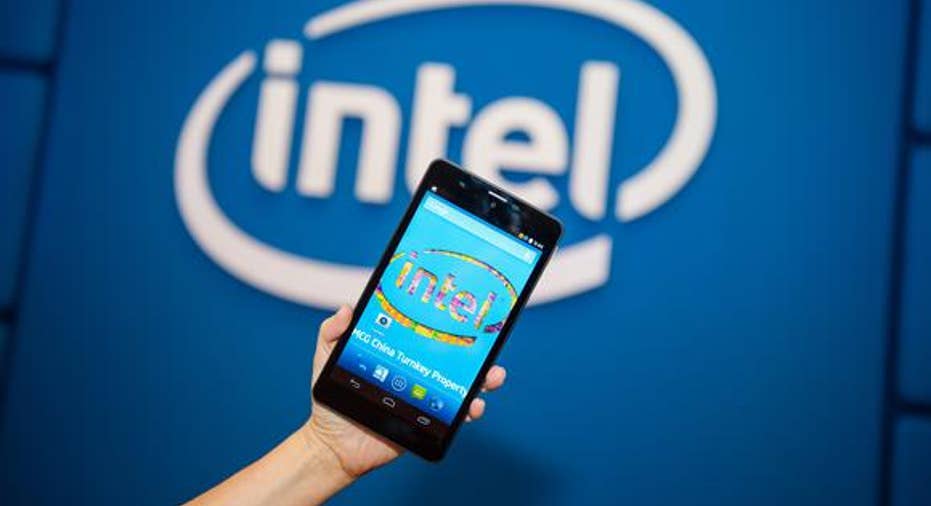Why Intel's Decision to Quit Mobile Could Make Investors Billions

Source: Intel.
Though it probably pains Intel shareholders to admit it, the battle for mobile-chip dominance was over before it ever began.
ARM Holdings' low-power architecture took the mobile world by storm before Intel had a chance to respond, not that that stopped the chip giant. However, after parceling out billions in pursuit of mobile market share, Intel has finally decided to hoist the white flag. Intel is officially giving up on mobile semiconductors, and its investors should be overjoyed.
Intel's mobile mic drop Intel has quietly admitted to a number of publications that it's shuttering its mobile-chip expansion efforts. Specifically, the company will cease development of its Broxton and SoFIA products, effectively killing its mobile product roadmap. This marks the close to a long and frustrating chapter in Intel's vaunted corporate history.
It will also go down as perhaps one of its most expensive mistakes ever.
As part of Intel's efforts to close the power-efficiency chasm between its own mobile-chip architectures and ARM Holdings', Intel spent aggressively. Some analysts estimate that Intel invested over $10 billionin recent years to get its Atom family of mobile processors ready to compete with ARM Holdings licensees such as Qualcomm and Samsung, with little tangible result.
At the same time, though, it isn't clear how beneficial creating a dominant mobile franchise would have been for Intel, particularly for its bottom line. Mobile chips tend to be smaller and less complex than Intel's workhorse PC and data center chip families, which also means they tend to command lower gross margins.
Even after declining in recent years, Intel's Client Computing Group produced operating margins of 25% in its most recent fiscal year, compared with 14% for Qualcomm's main chip segment. Viewed in this light, it isn't clear how much, if at all, the added revenue from a successful mobile-chip business would have benefited Intel's profit margins. If anything, this strengthens the case for Intel to simply move on from mobile chips.
Headed for greener pastures Equally important, Intel has a plausible strategy to align itself with another growth market, one that its product portfolio is far better suited to dominate -- the data center.
In a recent missive published on the company's blog, Intel CEO Paul Krzanich published a detailed account of Intel's ambitions to ride the boom in demand for data-center chips to post-PC-era profits.
Intel's Data Center Group, already its second-largest reporting segment with revenue of $4 billion in Q1, produces 49% operating margins. What's more, Intel dominates this space, supplying an estimated 99% of all data-center chips. Intel believes the Data Center Group can also grow sales at an average annual rate of 15% through 2020. As such, it seems far wiser for Intel to focus its efforts on the more profitable opportunity it enjoys in the data center, particularly as the smartphone and tablet markets show signs of maturing.
Source: Intel.
Freeing up capital earmarked for mobile-chip development should also give Intel added financial flexibility to engage in shareholder-friendly capital allocation moves, such as increasing share buybacks. The company has been a fairly disciplined repurchaser of its own shares in recent years. However, with shares trading at a P/E of 12 today, Intel would be doing current shareholders a favor by aggressively repurchasing shares.
So while Intel's move to scrap its mobile-chip roadmap might seem like a loss on the surface, it's actually a move its investors should love.
The article Why Intel's Decision to Quit Mobile Could Make Investors Billions originally appeared on Fool.com.
Andrew Tonner has no position in any stocks mentioned. The Motley Fool recommends Intel. Try any of our Foolish newsletter services free for 30 days. We Fools may not all hold the same opinions, but we all believe that considering a diverse range of insights makes us better investors. The Motley Fool has a disclosure policy.
Copyright 1995 - 2016 The Motley Fool, LLC. All rights reserved. The Motley Fool has a disclosure policy.



















